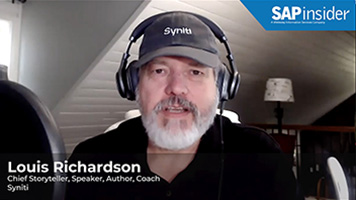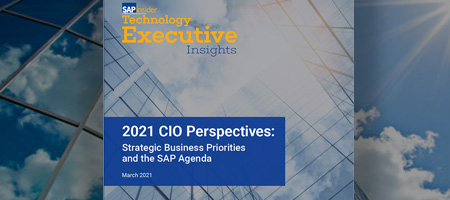The Innovation Imperative Hits Mid-Market: A CEO’s Perspective
By Rizal Ahmed, Chief Research Officer, SAPinsider
For mid-market companies facing competition from both multinational enterprises and startups, the pressure to transform is incredibly intense. Having lean, agile infrastructure and applications has become a priority for many SAP customers in this space as they rapidly adjust their business models and processes.
To better understand how they are coping and what the significant factors are, SAPinsider sat down with Norbert Rotter, CEO of NTT DATA Business Solutions. While the name still sounds new or like a newcomer, the opposite is in fact the case. The truth of the matter is that NTT DATA Business Solutions is one of the world’s largest and arguably best experts in the SAP industry. The reason for this is that NTT DATA Business Solutions emerged from former itelligence AG, one of a small number of SAP Platinum Partners worldwide, as of April 1, 2021.
Explore related questions
Since its inception, NTT DATA Business Solutions has been specializing in the midmarket space, offering an end-to-end range of transformation and consulting services and reselling SAP solutions. They are one of the largest resellers and service organizations catering to SAP solutions.
The old and new CEO Norbert Rotter outlined his perspective on emerging trends, new demands on service organizations like NTT DATA, and what’s driving change across both the business and IT landscape. In his opinion, “Transformation is not about technology, it is about making it work for you.” In the interview, he also shares some thoughts on SAP’s RISE offering.
Emerging Trends, Demand, and Drivers of Change
Competition and the need for speed are essential: According to Norbert Rotter, global companies are introducing new solutions, products, and services at a rapid pace. They are often faster in innovation and digitalization, which gives them an added advantage over other competitors in the industry. Mid‑market organizations especially are feeling this pressure. To compensate for this growing gap, leading-edge mid‑market companies are investing more heavily in IT and business operations.
“I think that the market, customers, and competition are demanding change and agility. You cannot compete unless you have ‘state‑of‑the‑art’ IT systems. The more you wait, the faster you will lose your place in the market. The slower your business and technology operations, the quicker you will fall behind,” says Rotter. “However, it is also important to keep in mind that the success of the transformation depends not only on the IT infrastructure or technologies, but also on empowering employees and getting them excited about using the new opportunities. Or as we say, transformation is not about technology, it is about making it work for you.”
It’s not just about IT projects, it’s about the change projects: Businesses are looking to impact processes and improve engagement with their partners and customers. According to Rotter, SAP projects are big transformation projects, not just pure IT projects. Transformation is more than migration, ultimately your business and IT operations must be closely aligned to lead and manage such change projects. Partners have to support customers in this way, but this also makes the engagement more complex. This is the reason why it is crucial to find a trusted, long-term partner, who both understands your business and market in depth and who can guide you on your own specific path towards an intelligent enterprise. “Customers are getting more global, and the work needs to become more integrated. Projects have rapidly evolved beyond just implementing a new system. Partners need to understand and review processes end-to-end,” he says.
COVID has pressed the need to improve the user experience and UX design: Remote communication and engagement have been the foundation of how companies interact. Users expect elegant, seamless experiences from both desktop and mobile devices, and this creates a need for a state‑of‑the‑art e‑commerce system that is flexible, adaptable, and responsive. “IT transformation must also meet this requirement. It is not only about perfectly transformed, automated processes, but also about usability for employees.”
Not every platform or service will survive as businesses move to the cloud: To meet demand for cloud-based services, NTT DATA Business Solutions has acquired 35 companies over the past several years in order to keep pace with SAP’s solution expansion and acquisitions. That is why like many other partners, NTT DATA Business Solutions will not only continue, but in fact step up its investment in the cloud and in hyperscaler solutions and offerings.
Companies prepare for strategic investments in core lines of business: Our SAPinsider State of the Market report showed that SAPinsiders are investing more heavily in core business areas like e‑commerce (39%), sales (35%), finance (34%), and the supply chain (34%). Rotter confirmed that he is seeing similar trends among mid‑market customers and prospects. The most relevant service for NTT DATA Business Solutions has been ERP transformation. Migrating to SAP S/4HANA brings substantial business opportunities, followed by new e‑commerce and CRM business as everything becomes cloud ready. There is also a significant demand for the supply chain as companies are investing in modernizing their supply chains. Other important areas include IoT development, analytics, and big data, creating a more comprehensive portfolio, he reports. “Especially when it comes to system conversion, we offer our own SAP qualified Partner Packaged solution, which is based on our conversion factory. With this solution, we enable companies to move to SAP S/4HANA within 20 weeks,” Rotter says.
The traditional SAP team will aggressively evolve, and companies will rely on partners to bolster skillsets: ABAP professionals are still vital to the team but are also aging out of the workforce. As more customers embrace enabling technologies, such as Artificial Intelligence, predictive analytics, cloud, IoT, and other emerging technologies, they will encounter a need to add these skills to their team. According to Rotter, mid‑market organizations are looking to partners like NTT DATA Business Solutions and the global network as they open up to support these skills and the cloud to offer these services. “We will massively enlarge our services around our own IP,” Rotter says.
“Customers have to think about how they can compete with this development, pushing to consider reducing their IT to the core, and then rely heavily on cloud solutions and service partners to outsource these services,” says Rotter.
A Partner and Mid‑Market Perspective on RISE
We talked to Rotter to get his viewpoint on RISE. From a partner’s perspective, he sees RISE as both an opportunity and a challenge. NTT DATA Business Solutions will sell and support the RISE offering within their customer base and related engagements from SAP.
Rotter is convinced that the core idea of RISE (i.e., to guide customers towards S4/HANA in the cloud as a concierge service) is a good one. It is a strong promise to sign a single contract, and have the related matters handled or coordinated by SAP. But when it comes down to the nitty gritty, it is not that simple, he states. “There might be customers who deliberately do not want to be completely dependent on SAP with a view to the entire stack. Even we, as one of the strongest and most loyal SAP resellers in the world, can understand this. So, we help our clients to benefit from RISE, but also manage these matters. Let me give an example: For some reasons, corporates may not want to put all of the processes into a public cloud. In this case, we guide them, helping them to find the individual perfect set-up, comprising managed services, private and public cloud. We also have customers who want to own the software as an on-premise solution due to other financial conditions.”
In Rotter’s opinion, the RISE initiative will facilitate the move to both SAP S/4HANA and the cloud while easing their transition to the hyperscaler environment. For mid‑market companies looking to reduce their data center complexity, this could be an attractive option.
For NTT DATA Business Solution’s own data center services, this will bring with it an element of competition. But with their extensive experience with both technology and business processes, NTT is a valued resource for RISE both with a view to potential clients and the actual project.
Rotter believes that customers will look seriously at the offering, especially when it comes to supporting the business case for a cloud-based transformation.
“RISE is definitely much more than just marketing. For SAP, it is critical to move faster to the cloud. For customers, it’s not a one-size-fits-all approach. Businesses that run their own IT and data centers are unlikely to switch to the new RISE just yet. What we will see is a world of combined cloud solutions, but with RISE as a dominant one,” predicts Rotter.
itelligence is now NTT DATA Business Solutions
Although rebranding itelligence as NTT DATA Business Solutions is a big step from a brand perspective, the company itself remains the same. The firm will continue to operate as a stand-alone company, with the same culture and mindset that has led to success over the years, supporting SAP projects in the mid‑market. Rotter is quick to explain that these differentiators have not changed and will continue to be relevant for the future. But together with the NTT DATA brand, its global reach, and set of technologies, Rotter feels that this will strengthen both organizations and their ability to serve their customers.

Norbert Rotter, CEO, NTT DATA Business Solutions
What Does This Mean for SAPinsiders
The road to transformation for mid‑market companies is not straightforward. Careful assessment and strategic planning of resources is critical for the survival and success of your business. Here are some pointers that SAPinsiders should be mindful of as you prepare for the transformation:
- Be aggressive in your change and transformation strategy: Watch out for the new solutions, products, and services that other leading companies are introducing. Rotter emphasized the pressure this puts on mid‑market companies and advises them to constantly grow in order to keep from falling behind.
- Take the time to analyze your current state and seek areas of improvement: Every company has opportunities to optimize business and IT processes. With the plethora of tools and services available, it is easier than ever to start looking at potential optimization. Take the time to perform this due diligence.
- Leverage partner companies and cloud services to accelerate the expansion of your knowledge and skills: Due to the rapid change and evolution of cloud applications and services, relying on partners to help fill knowledge and skills gaps can help you come up to speed more quickly. This is a crucial step for mid‑market companies as they run on limited financial resources. This means efficiently optimizing your relationships and connections.
- Start at your business and process foundation: Rotter confirms SAPinsider research which found that organizations are investing in foundational processes that support sales, finance, and supply chain. In times of disruption and uncertainty, managing cash flow, customers, and the flow of goods and materials is important to all organizations.





